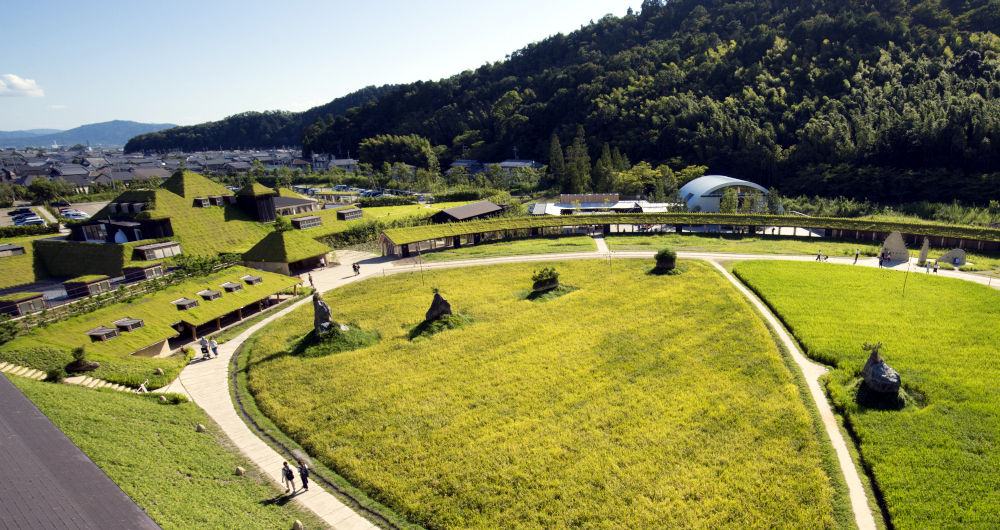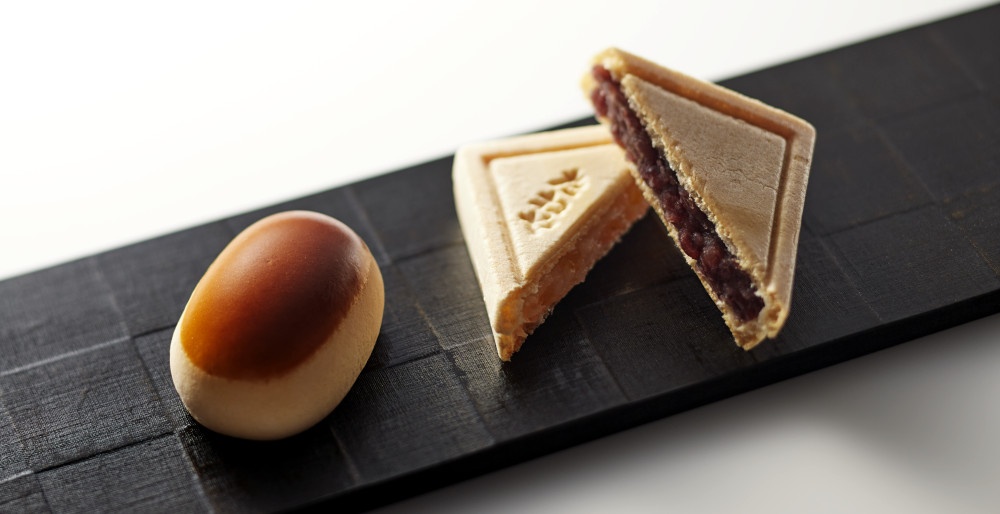Taneya Group’s founding principles are grounded in a concept called "sanpo yoshi" (“three-way satisfaction”), considered one of the roots of Japanese sustainability.
Japanese confectioner The Taneya Group is headquartered in
Shiga Prefecture’s Omihachiman city, the same place where its business
began over 150 years ago. Its founding principles are grounded in the natural
environment along the shores of Lake Biwa; and a concept that guided the
Omi merchants of old called sanpo
yoshi
(“three-way satisfaction”), considered one of the roots of Japanese
sustainability.
This philosophy is embodied at La Collina
Omihachiman, the flagship store for Taneya
Japanese-style sweets and its Club Harie brand
Western-style sweets. The company’s modern spin on traditional Japanese business
principles is helping lead the company to a more sustainable future.
 Image credit: Taneya
Image credit: Taneya
Not far from Lake Biwa, there is an entrance that leads to a lush area of low
bamboo grass, which extends to a large building that is covered in plants: La
Collina Omihachiman — the Taneya and Club Harie flagship store. Opened in 2015,
its design was inspired by the concept of “learning from nature,” and takes its
name from the Italian word for hill (“collina”).
The role of art in climate, sustainability and regeneration discourse
Benjamin Von Wong’s activist artistry transcends mere visual appeal — underlining the essential role of art in climate, sustainability and regeneration discourse. Join us as he explores the incredible potential of art as cultural commentary in raising awareness, and taking our shared behavioral and cultural pursuits to the next level — Wed, May 8, at Brand-Led Culture Change.
La Collina was developed on the site of the former Omihachiman city welfare and
pension facilities, and was designed to create a place for local people to
gather and connect. Concrete was removed to create a space like the original
landscapes of Omihachiman, where native plants and animals could flourish. It
was inspired by the traditional rural lands that used to stretch from the
village to Mount Hachiman, which rises up in the distance.
Looking out across La Collina, one can see the grass-covered roof of the
Kusayane main shop, the copper-roofed Doyane headquarters building, and
the Kuri-hyappon sponge cake shop which was built with over 100 chestnut
trees. Plants bring all the structures to life.
Founded in 1872, Taneya began as a lumber dealer before moving on to selling
plant seeds and seedlings; then finally, making Japanese confectionery. Even
after they began producing sweets, the local community still called them
taneya, or “seed seller”; so, the company took this as their official name:
“It was a name given to us by the people of Omihachiman,” says Keiko Omura
of Taneya’s business planning office.
The company was originally inspired to make Western-style confectionery thanks
to William Merrell
Vories, an
architect who was based in Omihachiman; and Club Harie was founded in 1951.
“Vories was an architect who built hospitals, schools and other facilities in
Omihachiman, and is said to have lived near Taneya,” Omura explained. “Having
come to Japan from the West, he had customs like afternoon tea. Learning about
this foreign culture, the Taneya confectioners predicted that there would be
demand for Western sweets in the future and began making them. They didn’t learn
directly from Vories himself, but he created opportunities for them to come in
contact with Western culture.”
Since then, the Taneya and Club Harie production of both Japanese and
Western-style sweets has been infused with a business philosophy held by Omi
Shonin — a group of
merchants renowned for their success in the Edo Period. The company follows the
spirit of sanpo-yoshi, or “three-way satisfaction” — which holds that the
seller, the buyer and wider society should all benefit.
“Our ‘three-way satisfaction’ is comprised of three tenets,” Omura said. “The
first is Tenbindo — a play on tenbinbo, which is the pole Omi merchants
would use to carry their wares from place to place. The idea of Tenbindo is to
not simply sell products, but to value cultivating one’s humanity in order to
make customers happy. It is the belief that sales ethics should be humanitarian
ethics. The second tenet is Akinai, or trade that nurtures. Persimmons used
to be the quintessential Japanese dessert, and the trees require a lot of care
to produce delicious fruits for sale; that nurturing and devotion were
important. The third tenet is Shokon, or one’s attitude towards sales. It’s
the importance of always considering the customer and reflecting on if you’re
making them happy each day.
“We benefit from nature’s abundance and use it to create delicious confectionery
for our customers. But thinking about the state of the world now makes us afraid
that this is something we won’t be able to continue forever. Our tables are full
with all kinds of food; but wondering how long this can last has made us realize
that we need to take action. This is why we have established the values that
drive our sustainability efforts.”
 Image credit: Taneya
Image credit: Taneya
These values — including producing confectionery sustainably, achieving carbon
neutrality, and promoting continuation of regional traditions and culture — are
the five pillars of Taneya’s vision for the future that are being widely
developed. One activity they’ve been recently focusing on is rice farming at La
Collina. Local people from all walks of life gather in the muddy rice paddies to
churn the soil, irrigate, plant rice, weed and harvest — spending time in
contact with the soil, learning from it and having fun.
La Collina is a place to discover what the embodiment of a sustainable future
looks like and could also be considered its starting point. It could be a future
born from the bonds of the people who have continued to live in Omihachiman, and
from the feel, color and taste of its earth.
As Omura pointed out: “For young people, these natural landscapes don’t bring
back memories. They don’t know what the area was like before it was developed,
so this is a revolutionary sight.”
In order to regain these majestic, lost environments and become a sustainable
business, the Taneya Group is pursuing important values while sowing the seeds
of the future.
Published Dec 4, 2023 2pm EST / 11am PST / 7pm GMT / 8pm CET
Sponsored Content
This article, produced in cooperation with the Sustainable Brands editorial team, has been paid for by one of our sponsors.